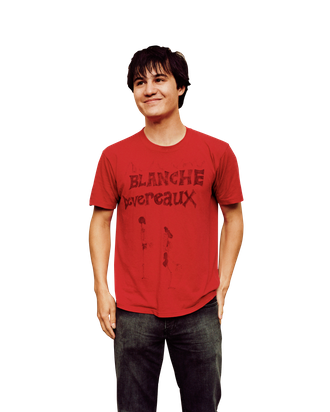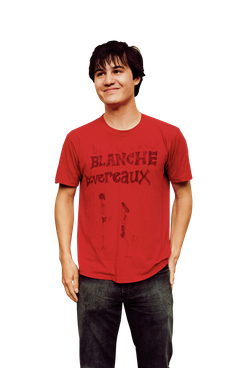

With 2008’s universally acclaimed Visiter, the Dodos became instant indie-rock darlings. Follow-up Time to Die, however, received a much cooler reception, with many critics feeling the album’s more polished sound neutered the group. Those critics should be pleased with the Dodos’ latest, No Color, released last Tuesday. A confident return to form, it showcases everything that listeners fell in love with, but with an added bite and vigor. Vulture recently talked with the Dodos’ front man Meric Long on reclaiming control in the studio, discovering the electric guitar, and making money.
No Color sounds a lot different than Time to Die. Were you trying to put that album behind you?
For us, it’s not as different as it may be perceived. Going into this one, we knew we wanted to make something that sounded different, and we wanted it to be obvious that it sounded different. With Time to Die, we were trying to do the same thing that we’d always done with the band, but because we were working with someone else and hadn’t made a record in a while, our perspective turned out to be quite different. This time around, we were going to make sure it happened under our own meticulous scrutiny … In my mind, I want to make this record fly by. I want it to just start, take off, and never let up until the end. Basically, by the end of the record you should be really tired. Your ears should be tired. Like, sick of this shit.
So you had more control over No Color?
Yeah, our relationship with [producer] John Askew, who did this record, was much more of a collaboration. Working with Phil [Ek, producer of Time to Die], we wanted someone to kind of, like, kick our asses. I wouldn’t say we had less control, because Phil really, like any good producer, wants the band to be happy. We got into that record with this sort of role of we’re having someone else come in, and we’re following his ears and his perspective more. We were more willfully deferring to him. John is more of like a bro-dude.
You guys started as a duo, and even though you’ve played with different lineups, you’re back to being a duo.
We wanted somebody else to be in the band, but it’s kind of hard to find the right person. Logan [Kroeber] and I, regardless if we admit it or not, have spent years touring together, and the band is sort of based around us playing together. It’s hard for any person to come in and become part of that. I could sense that with [former vibraphonist] Keaton [Snyder]. It was difficult for another person to jump in on something that was already pretty solid. At this point, it’s not so much our choice anymore. We went into this record as a trio and came out as a duo, because we let the record sort of decide what should be and what shouldn’t.
So Keaton was with you when you started recording the album?
Yeah, we recorded vibraphone on every song. When we started mixing the record, we started taking all the vibraphone off. Logan, John, and I mixed the record together. When we finished we were kind of, like, yeah we’re going to have to talk to Keaton. “Dude, there’s no vibraphone.” But he was cool with it; he understood.
How were the audiences at SXSW reacting to the new stuff?
I’m sort of having the time of my life playing electric guitar. I don’t notice the audience much, but it’s been super fun. I was afraid that we’d lose some of our audience with the new lineup, but it seems to being going over just as well if not better than previous shows.
You licensed “Fools” off of Visiter for a Miller Chill ad a couple of years ago. What were your reasons for that?
Money, man. That’s how we make money, unfortunately or fortunately, depending on how you look at it. I had some reservations about doing it, but there are certain levels of how much a band aligns themselves with the product. With that one, I felt like it was very small; it just sort of got blown out of proportion, in terms of reception. As a band we definitely got way more slack for that than other bands with very similar placements. We sort of got singled out and it was kind of shitty. It definitely wasn’t horrible. The only people who bring it up seem to be journalists. In the end, it was just a matter of weighing out the pros and cons. I worked as a line cook for seven years. It’s a shitty, tiring job, and I didn’t make a lot of money. This was going to allow me to not have to work my job and focus on music. I mean, that was a big deal. I didn’t have to go back to work and I literally spent my days writing and working on songs for Time to Die. The commercial was harmless. So yeah, we just went for it.
Would you license a song again?
It depends — it’s a total case-by-case basis. Like I said, if you’re a band, you have to do that to make money. Every band that makes money has placements. It’s just a matter of what those are, whether you see them or not. Some are really small. But of course, the more you sell yourself, the more you get.
Why do you think you got so much more crap than other bands?
It’s not not like “you guys sold out,” it’s just one of those things that gets mentioned all the time. It becomes one of those things that when people mention our band, they mention that.
Now that No Color is out, are you thinking about what’s next?
I’m kind of starting to think about what comes next. I have a tendency to do that. I haven’t really formulated a plan, but I’m more interested in sound than I ever have been. Other things are starting to sound good to me, so I’m probably just going to geek out for a long time. See what comes up, you know?




